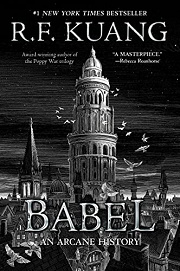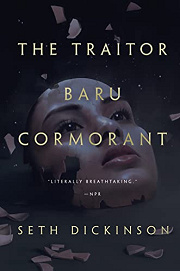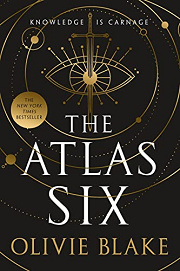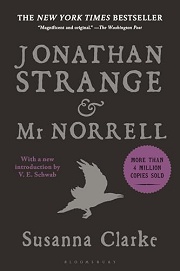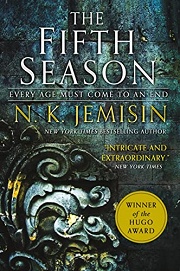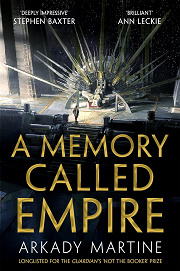Share your thoughts in a quick Shelf Talk!
Babel, or The Necessity of Violence: An Arcane History of the Oxford Translators' Revolution by R. F. Kuang
At a storied Oxford institute where language is literal power, scholars translate empire into dominance—until a student begins to question the cost. Erudite, propulsive, and incendiary, Babel is a spellbinding tale of academia, revolution, and the magic of words.
Have you read this book? Share what you liked (or didn’t), and we’ll use your answers to recommend your next favorite read!
Love Babel, or The Necessity of Violence: An Arcane History of the Oxford Translators' Revolution but not sure what to read next?
These picks are popular with readers who enjoyed this book. Complete a quick Shelf Talk to get recommendations made just for you! Warning: possible spoilers for Babel, or The Necessity of Violence: An Arcane History of the Oxford Translators' Revolution below.
In Babel, or The Necessity of Violence: An Arcane History of the Oxford Translators' Revolution, did you enjoy ...
... an anti-imperial struggle where language, finance, and bureaucracy become weapons?
The Traitor Baru Cormorant by Seth Dickinson
If watching Robin, Ramy, Victoire, and Letty learn how silverwork lets the British extract power from colonized languages—and then turning that knowledge against the empire—hooked you, you'll be riveted by The Traitor Baru Cormorant. Baru infiltrates the very bureaucracy that subjugated her home, mastering currency, policy, and coded speech much like Robin masters translation. The same cold calculus you saw in the Canton mission and the Hermes Society’s plots drives Baru’s schemes, culminating in betrayals and hard choices that echo Babel’s final, devastating stand.
... elite, cutthroat magical academia where a tight-knit cohort bonds—and fractures—under pressure?
The Atlas Six by Olivie Blake
If you loved the Fellowship’s lectures, late-night translations in the tower, and the way Robin’s cohort oscillates between loyalty and rivalry, The Atlas Six delivers that same charged campus intimacy. Six prodigies enter a secretive institute where knowledge is power and scarcity breeds manipulation—think Professor Lovell’s exacting demands and Babel’s patronage politics, but with a clandestine library, dueling theories of magic, and alliances as precarious as Robin and Letty’s.
... 19th‑century historical fantasy layered with scholarly footnotes and faux‑academic texture?
Jonathan Strange and Mr Norrell by Susanna Clarke
If Babel’s dense lectures, etymological asides, and footnote-rich worldbuilding made you feel like you were paging through a living archive, Jonathan Strange & Mr Norrell will scratch that same itch. Clarke’s narrative is laced with whimsical, revealing footnotes and academic digressions—much like Babel’s marginalia about silverwork pairings—while following magicians whose studies become entangled with national power, echoing Robin’s realization that scholarship isn’t neutral.
... piercing questions about who controls destructive power, and the human costs of resisting that control?
The Fifth Season by N. K. Jemisin
If Robin’s struggle over whether to use silverwork—the way he weaponizes translation on the bridge, and ultimately chooses a cataclysmic act at Babel—moved you, The Fifth Season wrestles with similar ethical fault lines. Orogenes can reshape the world, but only under brutal systems of control; like Robin and Griffin debating the Hermes Society’s tactics, Jemisin’s characters must decide what they’re willing to break to make anything new. It’s morally searing, intimate, and uncompromising.
... language‑savvy diplomacy and identity at the knife‑edge of empire politics?
A Memory Called Empire by Arkady Martine
If the Oxford translators’ chess game with Parliament—the wheedling dons, colonial administrators, and the Canton fallout—kept you turning pages, A Memory Called Empire offers equally deft intrigue. Ambassador Mahit navigates an imperial capital where poetry, rhetoric, and coded phrasing carry real power, much like Babel’s silverwork pairings turn meaning into force. The book blends court politics with the peril of assimilation in ways that mirror Robin’s fight to define himself against the empire he serves.
Unlock your personalized book recommendations! Just take a quick Shelf Talk for Babel, or The Necessity of Violence: An Arcane History of the Oxford Translators' Revolution by R. F. Kuang. It’s only a few questions and takes less than a minute.
